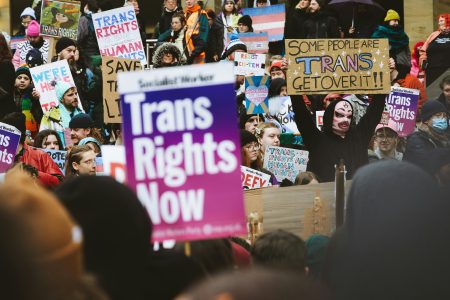Widgetized Section
Go to Admin » Appearance » Widgets » and move Gabfire Widget: Social into that MastheadOverlay zone
The Scapegoat in the Policy Game
The views expressed are those of the author and do not necessarily reflect the views of ASPA as an organization.
By Casey Renée Lopez
June 23, 2025

Policymaking often operates like a real-world chess game where citizens are stratified and maneuvered based on factors such as wealth, race or religion. But for the last 75 years, a new piece has been consistently sacrificed for political gain: the LGBTQ community. From the Lavender Scare of the McCarthy era to the “Don’t Ask, Don’t Tell” policy of the 1990s, and now to the wave of anti-transgender legislation across 2024 and 2025, policymakers have relentlessly crafted policies that marginalize Americans who challenge cisgender and heterosexual norms.
The targeting of transgender people is not a random or organic culture clash. It is a calculated political strategy to create a scapegoat, distract from complex societal problems and consolidate power by manufacturing moral panic around differences.
To understand how this works, we can turn to the work of political scientists Anne Schneider and Helen Ingram. They developed a framework that explains how policymakers categorize individuals into “target populations” based on their perceived political power and social construction. These groups range from the “advantaged” (seen as powerful and positive) to “deviants” (seen as powerless and negative). By successfully casting a group like transgender people—a relatively small population of 1.6 million—as “deviant,” political actors make it easy and politically cheap to propose punitive legislation against them. They create a readily identifiable group and stoke what they frame as “broad-based social anxieties” to distract from their own inefficacy in solving real crises in housing, education and the economy.
These manufactured crises, or “moral panics,” are a potent tool. Rather than tackle intractable issues, politicians and their allies in the media “use typifying and stereotyping behaviors to generate anxiety about a particular group,” placing that group’s very existence on the public agenda as a problem to be solved. Such strategizing isn’t a new tactic, but its modern focus is sharp. In 2024 alone, an unprecedented 669 anti-transgender bills were introduced across 43 states. The result is a fractured, inequitable landscape where access to essential services like healthcare, employment and even physical safety depends entirely on one’s zip code.
The consequences are devastatingly tangible. Consider how policies restricting gender-affirming care for transgender individuals are framed as necessary while cisgender people freely access similar “elective” procedures that affirm their own gender identities. This isn’t just hypocrisy; it is degenerative policy design. The harm extends into the justice system, where in 30 states, “trans panic” defenses can be used in court, allowing violent attackers to argue that their victim’s gender identity provoked the assault—a loophole that essentially justifies bigotry.
These policies also create collateral damage. Bills like the “Save Women’s Sports Act” are designed to exclude transgender women but end up harming cisgender women who don’t conform to rigid biological stereotypes. Just ask Olympian runner Caster Semenya, a cisgender woman who was banned from competing because of her naturally high testosterone levels. The very policies meant to “protect” women in sports are used to punish them due to transphobia.
This machinery of marginalization doesn’t run on its own. It requires the cooperation of bureaucrats and public administrators. While politicians create the laws, it is often public servants who implement them. To address such a phenomenon, Guy Adams and Danny Balfour coined the term “administrative evil.” Through administrative evil, harm is inflicted not necessarily through malicious intent but through the dispassionate, “technically rational” application of discriminatory rules. When an administrator enforces a discriminatory ID requirement that results in the persistent misgendering of a transgender person, they become an instrument of that policy’s degenerative design, prioritizing impersonal efficiency over human dignity.
So, what is the path forward? Fortunately, social norms can shift with surprising speed. The journey for lesbian, gay and bisexual rights over the past 40 years shows that progress is possible, even if transgender people currently remain stuck in political purgatory.
To overcome this cycle of scapegoating, the solutions must be multi-pronged. First, we must increase the active and passive representation of transgender people in public service. Research shows that when people from a specific community are involved in creating and implementing policies that affect them, the outcomes are more equitable and effective. Second, educators and researchers play a critical role as “unofficial actors,” using their platforms to challenge junk science, promote social equity and guide students toward grassroots activism. Finally, and most fundamentally, policymakers and administrators must listen to the communities they serve.
The relentless targeting of transgender Americans is more than a culture war; it is a symptom of a degenerative democracy. By designing policies to punish a vulnerable minority, we not only inflict immense harm on that group but also erode the very principles of equity that public administration is meant to uphold. Moving toward a more just future requires us to see these policies for what they are: a cynical distraction. We must lead with empathy, evidence-based decisions and a steadfast commitment to serving all members of the public.
Author: Casey Renée Lopez is a Ph.D. student in Public Policy at the L. Douglas Wilder School of Government and Public Affairs at Virginia Commonwealth University. They hold two Master of Arts degrees in Interdisciplinary Studies and European History, respectively. They also teach in the English Department at Brightpoint Community College in Midlothian, Virginia. In the classroom, they enjoy introducing their students to literary works that highlight social policy and environmental issues. As a student, they are primarily interested in violence intervention policy research related to transgender people and other marginalized groups. Through transdisciplinary work, they aim to contribute to the development of more research on social equity as it pertains to the transgender community in and around the Richmond, Virginia, metropolitan area.


Follow Us!